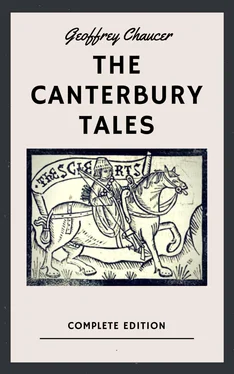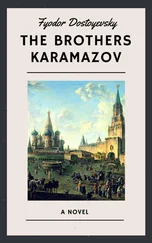Hath all the bodies on an heap y-draw,
And will not suffer them by none assent
Neither to be y-buried, nor y-brent*, *burnt
But maketh houndes eat them in despite."
And with that word, withoute more respite
They fallen groff,* and cryden piteously; *grovelling
"Have on us wretched women some mercy,
And let our sorrow sinken in thine heart."
This gentle Duke down from his courser start
With hearte piteous, when he heard them speak.
Him thoughte that his heart would all to-break,
When he saw them so piteous and so mate* *abased
That whilom weren of so great estate.
And in his armes he them all up hent*, *raised, took
And them comforted in full good intent,
And swore his oath, as he was true knight,
He woulde do *so farforthly his might* *as far as his power went*
Upon the tyrant Creon them to wreak*, *avenge
That all the people of Greece shoulde speak,
How Creon was of Theseus y-served,
As he that had his death full well deserved.
And right anon withoute more abode* *delay
His banner he display'd, and forth he rode
To Thebes-ward, and all his, host beside:
No ner* Athenes would he go nor ride, *nearer
Nor take his ease fully half a day,
But onward on his way that night he lay:
And sent anon Hippolyta the queen,
And Emily her younge sister sheen* *bright, lovely
Unto the town of Athens for to dwell:
And forth he rit*; there is no more to tell. *rode
The red statue of Mars with spear and targe* *shield
So shineth in his white banner large
That all the fieldes glitter up and down:
And by his banner borne is his pennon
Of gold full rich, in which there was y-beat* *stamped
The Minotaur<8> which that he slew in Crete
Thus rit this Duke, thus rit this conqueror
And in his host of chivalry the flower,
Till that he came to Thebes, and alight
Fair in a field, there as he thought to fight.
But shortly for to speaken of this thing,
With Creon, which that was of Thebes king,
He fought, and slew him manly as a knight
In plain bataille, and put his folk to flight:
And by assault he won the city after,
And rent adown both wall, and spar, and rafter;
And to the ladies he restored again
The bodies of their husbands that were slain,
To do obsequies, as was then the guise*. *custom
But it were all too long for to devise* *describe
The greate clamour, and the waimenting*, *lamenting
Which that the ladies made at the brenning* *burning
Of the bodies, and the great honour
That Theseus the noble conqueror
Did to the ladies, when they from him went:
But shortly for to tell is mine intent.
When that this worthy Duke, this Theseus,
Had Creon slain, and wonnen Thebes thus,
Still in the field he took all night his rest,
And did with all the country as him lest*. *pleased
To ransack in the tas* of bodies dead, *heap
Them for to strip of *harness and of **weed, *armour **clothes
The pillers* did their business and cure, *pillagers <9>
After the battle and discomfiture.
And so befell, that in the tas they found,
Through girt with many a grievous bloody wound,
Two younge knightes *ligging by and by* *lying side by side*
Both in *one armes*, wrought full richely: *the same armour*
Of whiche two, Arcita hight that one,
And he that other highte Palamon.
Not fully quick*, nor fully dead they were, *alive
But by their coat-armour, and by their gear,
The heralds knew them well in special,
As those that weren of the blood royal
Of Thebes, and *of sistren two y-born*. *born of two sisters*
Out of the tas the pillers have them torn,
And have them carried soft unto the tent
Of Theseus, and he full soon them sent
To Athens, for to dwellen in prison
Perpetually, he *n'olde no ranson*. *would take no ransom*
And when this worthy Duke had thus y-done,
He took his host, and home he rit anon
With laurel crowned as a conquerour;
And there he lived in joy and in honour
Term of his life; what needeth wordes mo'?
And in a tower, in anguish and in woe,
Dwellen this Palamon, and eke Arcite,
For evermore, there may no gold them quite* *set free
Thus passed year by year, and day by day,
Till it fell ones in a morn of May
That Emily, that fairer was to seen
Than is the lily upon his stalke green,
And fresher than the May with flowers new
(For with the rose colour strove her hue;
I n'ot* which was the finer of them two), *know not
Ere it was day, as she was wont to do,
She was arisen, and all ready dight*, *dressed
For May will have no sluggardy a-night;
The season pricketh every gentle heart,
And maketh him out of his sleep to start,
And saith, "Arise, and do thine observance."
This maketh Emily have remembrance
To do honour to May, and for to rise.
Y-clothed was she fresh for to devise;
Her yellow hair was braided in a tress,
Behind her back, a yarde long I guess.
And in the garden at *the sun uprist* *sunrise
She walketh up and down where as her list.
She gathereth flowers, party* white and red, *mingled
To make a sotel* garland for her head, *subtle, well-arranged
And as an angel heavenly she sung.
The greate tower, that was so thick and strong,
Which of the castle was the chief dungeon<10>
(Where as these knightes weren in prison,
Of which I tolde you, and telle shall),
Was even joinant* to the garden wall, *adjoining
There as this Emily had her playing.
Bright was the sun, and clear that morrowning,
And Palamon, this woful prisoner,
As was his wont, by leave of his gaoler,
Was ris'n, and roamed in a chamber on high,
In which he all the noble city sigh*, *saw
And eke the garden, full of branches green,
There as this fresh Emelia the sheen
Was in her walk, and roamed up and down.
This sorrowful prisoner, this Palamon
Went in his chamber roaming to and fro,
And to himself complaining of his woe:
That he was born, full oft he said, Alas!
And so befell, by aventure or cas*, *chance
That through a window thick of many a bar
Of iron great, and square as any spar,
He cast his eyes upon Emelia,
And therewithal he blent* and cried, Ah! *started aside
As though he stungen were unto the heart.
And with that cry Arcite anon up start,
And saide, "Cousin mine, what aileth thee,
That art so pale and deadly for to see?
Why cried'st thou? who hath thee done offence?
For Godde's love, take all in patience
Our prison*, for it may none other be. *imprisonment
Fortune hath giv'n us this adversity'.
Some wick'* aspect or disposition *wicked
Of Saturn<11>, by some constellation,
Hath giv'n us this, although we had it sworn,
So stood the heaven when that we were born,
We must endure; this is the short and plain.
This Palamon answer'd, and said again:
"Cousin, forsooth of this opinion
Thou hast a vain imagination.
This prison caused me not for to cry;
But I was hurt right now thorough mine eye
Into mine heart; that will my bane* be. *destruction
The fairness of the lady that I see
Yond in the garden roaming to and fro,
Is cause of all my crying and my woe.
I *n'ot wher* she be woman or goddess, *know not whether*
But Venus is it, soothly* as I guess, *truly
And therewithal on knees adown he fill,
And saide: "Venus, if it be your will
You in this garden thus to transfigure
Читать дальше












